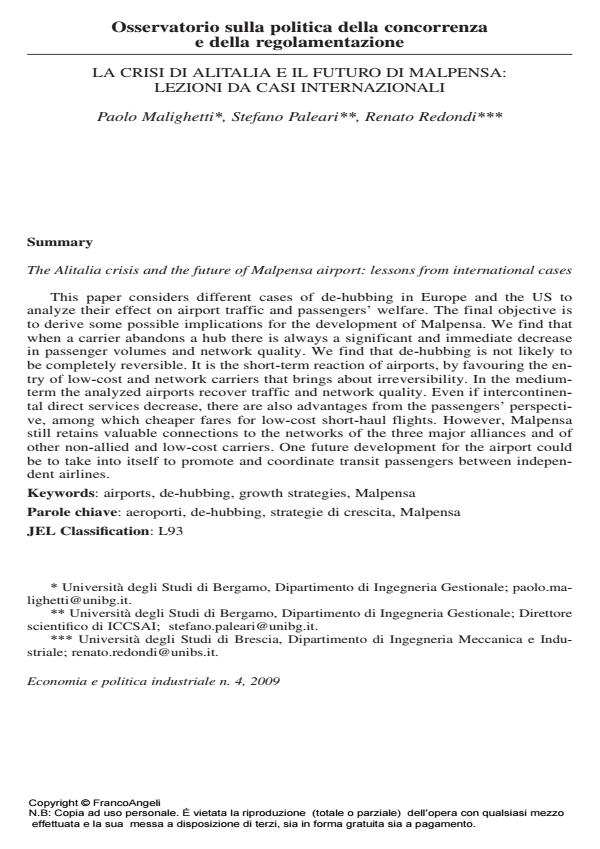La crisi di Alitalia e il futuro di malpensa: lezioni da casi internazionali
Journal title ECONOMIA E POLITICA INDUSTRIALE
Author/s Paolo Malighetti, Stefano Paleari, Renato Redondi
Publishing Year 2009 Issue 2009/4
Language Italian Pages 15 P. 151-165 File size 878 KB
DOI 10.3280/POLI2009-004008
DOI is like a bar code for intellectual property: to have more infomation
click here
Below, you can see the article first page
If you want to buy this article in PDF format, you can do it, following the instructions to buy download credits

FrancoAngeli is member of Publishers International Linking Association, Inc (PILA), a not-for-profit association which run the CrossRef service enabling links to and from online scholarly content.
The Alitalia crisis and the future of Malpensa airport: lessons from international cases This paper considers different cases of de-hubbing in Europe and the US to analyze their effect on airport traffic and passengers’ welfare. The final objective is to derive some possible implications for the development of Malpensa. We find that when a carrier abandons a hub there is always a significant and immediate decrease in passenger volumes and network quality. We find that de-hubbing is not likely to be completely reversible. It is the short-term reaction of airports, by favouring the entry of low-cost and network carriers that brings about irreversibility. In the mediumterm the analyzed airports recover traffic and network quality. Even if intercontinental direct services decrease, there are also advantages from the passengers’ perspective, among which cheaper fares for low-cost short-haul flights. However, Malpensa still retains valuable connections to the networks of the three major alliances and of other non-allied and low-cost carriers. One future development for the airport could be to take into itself to promote and coordinate transit passengers between independent airlines.
Keywords: Airports, de-hubbing, growth strategies, Malpensa
Jel codes: L93
- The impact of air transportation on trade flows: A natural experiment on causality applied to Italy Alberto Brugnoli, Antonio Dal Bianco, Gianmaria Martini, Davide Scotti, in Transportation Research Part A: Policy and Practice /2018 pp.95
DOI: 10.1016/j.tra.2018.01.010
Paolo Malighetti, Stefano Paleari, Renato Redondi, La crisi di Alitalia e il futuro di malpensa: lezioni da casi internazionali in "ECONOMIA E POLITICA INDUSTRIALE " 4/2009, pp 151-165, DOI: 10.3280/POLI2009-004008